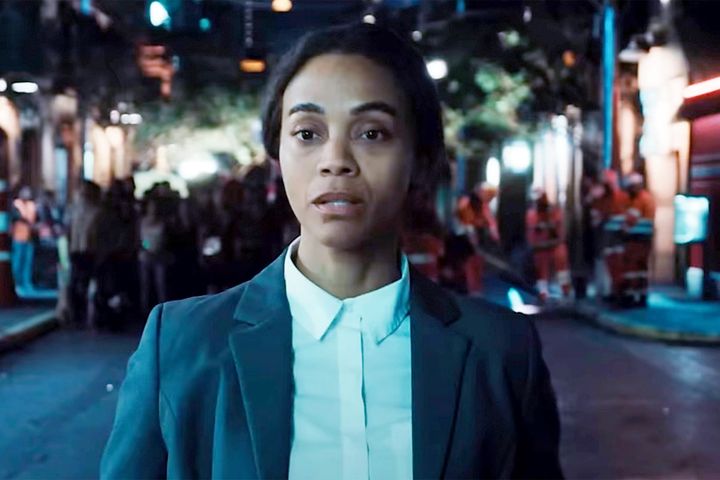
What to watch at TIFF 2011, pt. 2
Yes, the film-selection and scheduling stages of the Toronto International Film Festival are still upon us. By now, Torontonians have either spent a minimum of three hours waiting in lines and filling out page after page of those annoying order forms, or knocked back a couple of forties while glazing over that interminable line-up. This year, there are too many films — again — and worse yet, there are too many good films. A few days ago we laid out about a dozen hits and misses in our first preview post, and now, in the true spirit of our contemporary film industry, we've put together the sequel.
HIGHLY RECOMMENDED
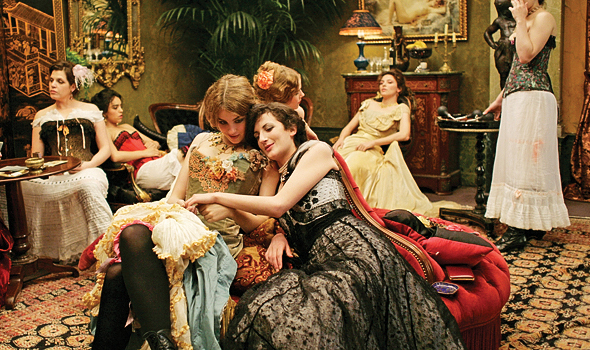
HOUSE OF TOLERANCE (September 10, 3:15PM; September 13, 2PM; September 17, 6:45PM)
Don't believe the dismissals coming out of Cannes last May, this film is stunningly gorgeous and packs a huge wallop. Playing like the estrogen-driven second cousin to Claire Denis' operatic Beau Travail, Bertrand Bonello focuses this studied period piece on a turn-of-the-century French brothel (circa 1900), and trades in his usual shock sensibilities for a matured and studied elegance. He observes these young women in painterly compositions that recall the decadent ennui of French Romanticism, while setting their movements to a soundtrack of soul and gospel music that was clearly recorded after the film takes place (a key scene sets a mournful dance to The Moody Blues' Nights in White Satin, as if it coos diegetically from a radio that is apparently broadcasting the future). The film takes all kinds of bold risks to relate the women's plight across decades of objectification and suffering, and the results are tragic, lush, and - somehow - endearingly optimistic. (BW)
THE SKIN I LIVE IN (September 11, 10PM; September 17, 9:30AM)
A debauched, high camp mashup of Face/Off, OldBoy, and the world's glossiest telenovela, The Skin I Live In takes Pedro Almodóvar's signature, soapy sensibility and applies an ingeniously effective genre (plot) twist. Antonio Banderas is terrifically deranged as Dr. Robert Ledgard, a world-renowned plastic surgeon capable of effecting the sort of fanciful transformation that turned John Travolta into Nicolas Cage. He's likewise capable of acts of vengeance that are positively South Korean in their extremity, and, fittingly, also demonstrates a proclivity for sexual transgression that would make Chan-wook Park proud. Beyond these (hopefully) enticing teases, the less you know, the better, save that Almodóvar springs what would be a lesser film's crowning reveal just past Skin's midpoint. This paves the way for a superbly subversive third act, wherein the tropes of the rape-revenge fantasy are turned inside out. Almodóvar clearly delights in an unhinged exploration of his favored themes, including the consuming, self-destructive nature of passionate desire, and the malleability of sexual identity and orientation. I was cooler on his last film (Broken Embraces) than most, but The Skin I Live In is a thrilling surprise in more ways than one. (JC)
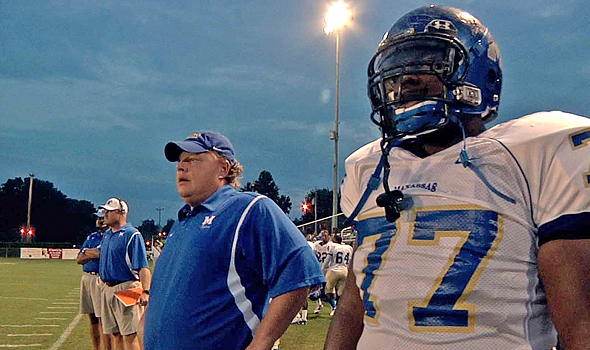
UNDEFEATED (September 13, 5:30PM; September 14, 5PM)
Manassas High School is an inner-city school in Memphis, Tennessee that doesn't have much going for it. The surrounding area is depressed, plants have closed and businesses and jobs have never quite moved back. But thanks to volunteer football coach Bill Courtney, some things are going to change. This is Courtney's 6th year coaching the football team which has never won a playoff game in its 110 year history, but this year he believes things will be different. With a strong squad comprising of some talented seniors, Courtney trains and teaches his players what it is to play for a team and for the betterment of yourself and other people. His line has some rather spectacular players such as O.C., a 300lb player who has no right being as fast as he is, Money a tiny right tackle who is on the honor roll and looking for a scholarship and Chavis, a juvenile delinquent back on team after spending a year in a youth penitentiary. With starting players as diverse as this, things aren't easy and throughout the year Courtney is challenged time and again, pushed to his breaking point to help this team. A riveting sports documentary that puts emphasis on character building more than playbooks, and support and courtesy rather than brute strength, it's an extremely moving story that's worth every minute. (DD)
ONCE UPON A TIME IN ANATOLIA (September 13, 6:15PM; September 14, 8:45AM; September 16, 5:45PM)
In an absurd game of one-upmanship, Nuri Bilge Ceylan takes the shell of the idea behind 2009's Romanian procedural Police, Adjective and distends it to the point where stretch marks can almost be seen on the edges of the frame. Unlike pretty much any other filmmaker currently working in Europe, Ceylan understands the weight of light in his images, and - especially in its first half - Anatolia has very little photonic action. But the surface stylings and hints at an investigative narrative are mere MacGuffins for the actual concerns bubblin' under. Translating any and all life and humanity into pure, austere text via waves of autopsies, field reports, and storied myths, what we're really confronting here is the very core of existential anxiety: how will we be remembered when every trace of our bodies and souls no longer takes up space on Earth? If it is in fact through textual legacies and cataloging, as the film posits, can we truly rest in peace? Asking such questions is daring and fruitful enough, perhaps, but lacing them into the DNA of a red-eye murder investigation, beneath the most paralyzing thunderclaps to ever blare through a Dolby Digital system, is transfixing in a way that few films can compare with. (BW)
RECOMMENDED

CAFÉ DE FLORE (September 12 10PM; September 14, 11:45AM)
Jean-Marc Vallee does it again, the director of C.R.A.Z.Y and The Young Victoria is a master at subverting your expectations with his films, making the programming folks scratch their heads as they attempt to create a concise description of his work. Cafe de Flore is no exception, we're introduced to two seemingly unconnected storylines; a young mother in France in the late 60's struggling with raising her son with Down's Syndrome and a middle aged DJ in 2010 who is struggling with his conscience after leaving his wife of twenty years for a new love, his assumed soulmate. Music plays a key role in this film, precisely those songs that stick with you deep down in your bones and envoke pain, love, calm and adrenaline. The story ebbs and flows as characters have dream-like visions when they're not careening against each other, struggling to control their own happiness and holding onto the people they love with all their might. The first hour of the film is a more whimsical and lovely tale of love and devotion but it's the second hour, when love takes that obsessive turn, that darkens the mood. While I'm still questioning the sequence of events, I MUST implore you to stay through the credits. (DD)
MELANCHOLIA (September 10, 6PM; September 17, 2:45PM
As a director with a credible claim to the title of "world's most polarizing filmmaker," Lars von Trier's latest feat of cinematic nihilism inspired more ambivalence than I'd anticipated. Certainly, conceptually, von Trier's apocalyptic tragedy of manners is supremely accomplished, and approaches Terrence Malick's The Tree of Life as a work of outrageous beauty. Emotionally, though, Melancholia mostly left me cold (unexpectedly, coming from an arch provocateur). Indeed, Melancholia is virtually the anti-Tree of Life. Both films pair candidly intimate family portraits with humbling scenes of celestial violence, but reach opposing conclusions. Malick views the world with a rapturous, spiritual reverence. Von Trier, ever morose, wouldn't be bothered if it ended tomorrow. His self-admitted bouts with depression and anxiety are represented, respectively, by sisters Justine (Kirsten Dunst) and Claire (Charlotte Gainsbourg). Both are participants, as bride and hostess, in an implosively calamitous upper-class wedding, before it emerges that a once-hidden planet will collide, catastrophically, with Earth. Performance-wise, both are superb, as is von Trier's staging of these decidedly unhappy events. But as for the actual characters they play, I'm genuinely unsure that I care. (JC)
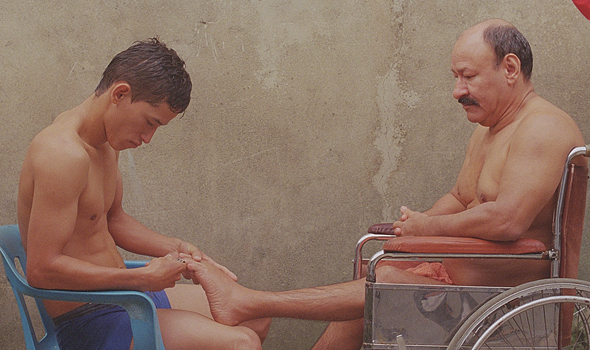
PORFIRIO (September 9, 7PM; September 11, 9:30PM; September 18, 7PM)
A strong project from South America that transfers the daily life of a man who hijacked a plane using grenades that were hidden in his diapers into a contemplative and formally sturdy glimpse of stasis. The film is just as much Porfirio's as it is Landes', as the wheelchair-bound hijacker plays himself in the film after also being very involved in the penning stages. Shot in wide-angled lenses that trap Porfirio in a space that always seems to be closing in on him, Landes details the injustices of the physically disabled in Colombia with a strict visual style to accompany the ultra-realistic performances. The ultimate impact may be short on pathos, but its themes of immobility and claustrophobia are presented with such assured strokes for a first-time feature filmmaker that there is nary a wasted or dull moment. Coming in amidst a trend of Latin American fiction/doc hybrids, it's a haunting and quietly incendiary entry from a promising new voice. (BW)
MACHINE GUN PREACHER (September 11, 6:30PM; September 16, 12PM)
Guaranteed to be some serious Oscar bait, Machine Gun Preacher is based on the real-life experiences of one Sam Childers, an ex-con-turned-preacher who went to Sudan as a church building missionary and ended up becoming involved in child welfare in the war-torn country. Gerard Butler does an interesting turn as a flawed man who through extremely strong faith, struggles with his new-found sobriety and moral code in a country ravaged by war and violence. Michelle Monaghan adds another 'suffering wife/girlfriend' role to her resume, but this is really Butler's show. The film is surprisingly tight but does suffer from some scenes that really try to play on your sympathy, as if you didn't think landmines and machine guns and child soldiers were bad enough they give you some unnecessary gore. On the flipside, there are some interesting juxtapositions with the American and Sudanese sequences that really emphasize how Childers found himself truly split on opposite sides of his psyche and the world. (DD)
NOT RECOMMENDED
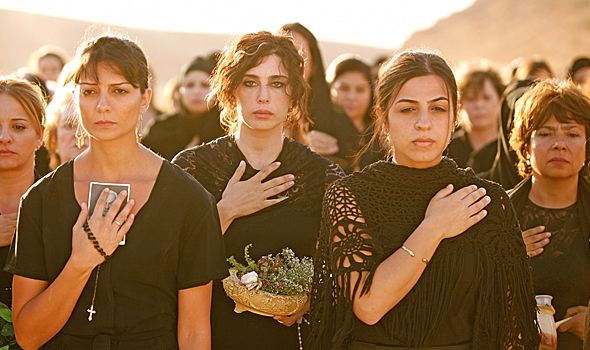
WHERE DO WE GO NOW? (September 10, 6:30PM; September 11, 9:30AM, September 17, 9AM)
Hash-laced baked goods are the opiate of the masses in Nadine Labaki's cartoonishly over-broad quasi-musical, Where Do We Go Now? Religion, in contrast, is purely a potent irritant for the inhabitants of an isolated, unnamed Middle-Eastern village. Initially, the townspeople - all either devoutly Christian or Muslim - manage to cohabit in peace, until news of sectarian violence in surrounding regions provokes a series of farcical misunderstandings. Seemingly inspired by mutual religious intolerance, these events, in turn, give rise to increasingly sacrilegious reprisals among the suddenly senseless, belligerent menfolk. Possessed of cooler, more cunning heads, the women hatch a collective scheme to heal the widening rift, involving a troupe of Ukrainian showgirls and, yes, lots and lots of hash. While these ingredients might make for a dynamite half hour of South Park, at 100 minutes, Labaki's feature begins to bludgeon you with its facile theses: religious violence is asinine, we're all the same on the inside, men are hot-headed dumb-dumbs. Add problematic shifts in tone, flat characterization, and an aimless inter-faith romantic subplot, and you've got a muddled if well-meaning misfire. (JC)
ARIRANG (September 11, 10PM; September 13, 2:45PM; September 14, 2:30PM)
The niceties that one could throw at such a narcissistic and, to be blunt, pathetic project of this sort are few and far between. Kim Ki-duk, who is actually a fine director and has brought us many of the staples of the New Korean canon (3-Iron, Time, Spring, Summer, Fall, Winter... and Spring, etc.), has lost his marbles. After an accident involving a guillotine almost killed the lead actress during the production of his 2008 film Dream, Kim was overcome with guilt and succumbed to a mighty case of 'director's block'. Imagining for a moment that you actually care about Kim's well-being and have been over-perspiring in anticipation for his elusive follow-up to Dream, would it be any relief or consolation to see him, without a hint of irony, proclaiming his own importance and brilliance for 100 minutes? When he isn't lecturing us with some of the most soporific and pedestrian insights into cinema that have ever been uttered by a major filmmaker, he's warbling out the titular folk song, building a gun, having conversations with himself, and crying while watching scenes from his own films. Maybe this can be defended by some esoteric Buddhist doctrine, but this is a DVD extra feature at best. (BW)
MONSIEUR LAZHAR (September 11, 9:45PM; September 14, 3:30PM)
For what is ultimately such an airy and agreeable film, Philippe Falardeau's Monsieur Lazhar is prefaced by an act that is difficult to interpret as anything but willfully hostile: A primary school teacher has hanged herself in her classroom, presumably knowing full well that her students will be first to discover the horrific scene. Beyond the bald statement that this woman - despite being widely beloved - was "unwell", the implicit motive for her astoundingly inappropriate choice of venue is revenge on a manipulative pupil with whom she'd had a row. What details eventually emerge on this point are anticlimactic, and the result is a film that, for all its general virtues of craft, is premised on an event that remains, distractingly, both provocative and opaque. Oddly for an "inspirational teacher" film, its characters also remain relatively developmentally inert. The students are basically a bright, well-adjusted bunch, and brief moments of distress aside, they remain so throughout. Similarly, genial refugee claimant-come-substitute-teacher Bachir Lazhar (Algerian humorist Fellag) arrives to less a culture shock than a gentle culture surprise, and is only cursorily perturbed by an ostensibly tragic past event. Offering vague answers to its own pointed questions, Monsieur Lazhar disappoints, especially as a follow-up to Falardeau's delightful TIFF 09 coming-of-ager, It's Not Me, I Swear! (JC)
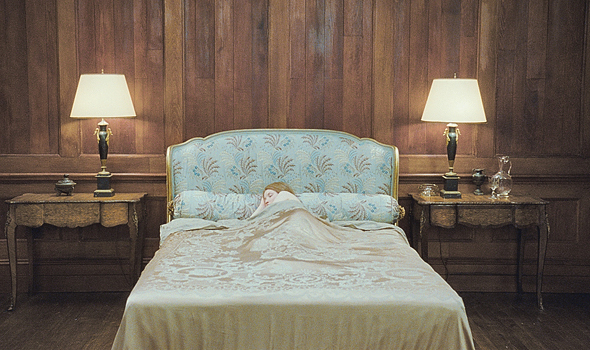
SLEEPING BEAUTY (September 14, 9:30PM; September 18, 4PM)
Waif-like Lucy is a lovely yet dissatisfied university student down on her luck and desperate for cash she works as a filing clerk in an office, a server at a restaurant and a clinical trial participant. When she answers an ad for what seems like an escort business she's so seemingly disillusioned and accustomed to being exploited for labour she takes the invasive interview in stride as well as the subsequent tasks asked of her. Julia Leigh paints a bleak, dull world for Lucy, she's an emotionless drone throughout the film and the few times she shows any particular interest in another person it's selfish and off-putting. You don't LIKE her and as the film meanders on, one begins anticipating chaos at every corner and almost wishing some sort of menace to propel the plot further. All in all, the film mimics reality in the way that sometimes situations don't really go awry and just unfold naturally with no fanfare or excitement. Unfortunately this makes a drab, dull story but at least the set design was lovely. (DD)
Contributions by Blake Williams (BW), Danielle D'Ornellas (DD), and Julian Carrington (JC)
For detailed festival information, visit tiff.net. Single tickets will available to purchase as of September 3rd online, by phone: 416-599-TIFF, or in person: Metro Hall concourse (advanced box office) and various venues including the TIFF Bell Lightbox (day-of tickets only).
Update (11:30 a.m.):
Here's a helpful little video that explains how to acquire single-day tickets, which go on sale tomorrow.
Latest Videos
Latest Videos
Join the conversation Load comments





